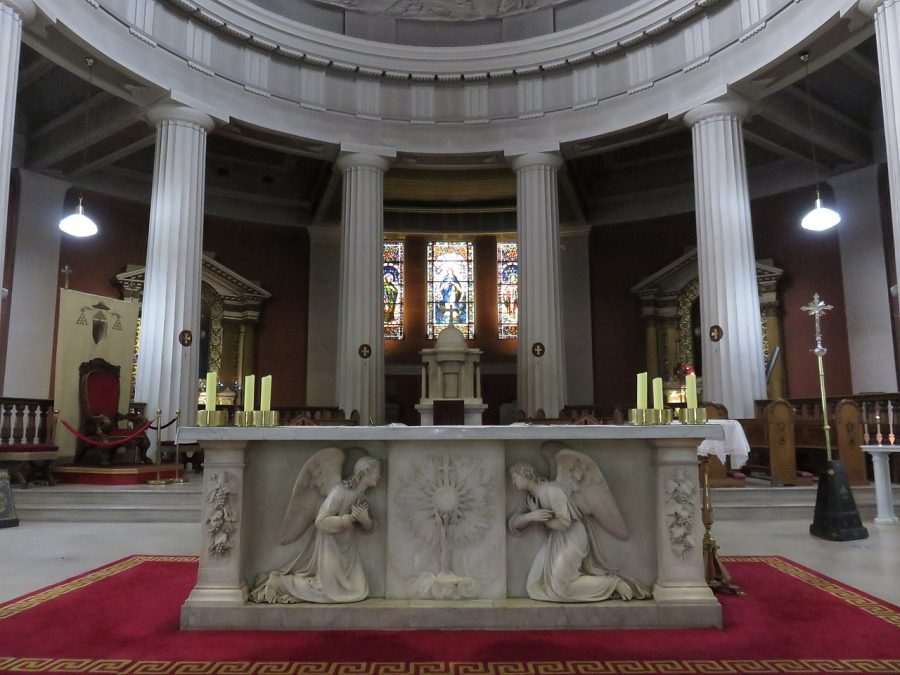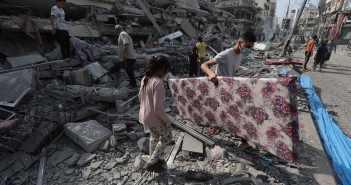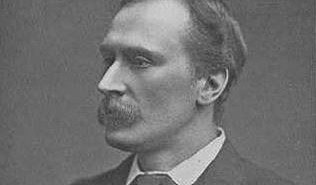On the LUAS, she counts thirty cranes spiking the skyline. She hasn’t seen this many since 2007. The entire journey into town, she keeps her face visible; she doesn’t care who sees the scar snaking from her cheek to the bridge of her nose. Under her jacket, she grips the hunting knife, reassuringly heavy against her rib.
She gets off at Westmoreland and heads across the river to the northside, cutting down a side-street that leads to the Pro-Cathedral. The cathedral, or the heart of the city, Gavin once called it. She keeps her head up and her pace brisk, ignoring the eddy of activity around her and the odd looks she gets for the scar.
On O’ Connell Street, rush-hour crowds pitch and roll at traffic lights. She ignores seagulls screeching from the boardwalk, convoys of buses and LUAS clangs, Deliveroo cyclists dodging cycle-lanes, bouncers invigilating in doorways, the fluorescent glare from Supermac’s, haggard junkies lurching between double-yellows and taxi ranks. Under the GPO’s bullet-bejewelled portico, she spots a young girl huddled in a sleeping bag, forlornly holding out a styrofoam cup like an offering. Homeless in her hometown. She leans and drops a few coins in the cup, then keeps on walking, barely hearing the weary “Ah, thanks, Love” the girl murmurs after her. Two guards turn to watch her pass. They notice her scar, but she ignores them. Their high-vis jackets sting her eyes.
The heavy timber doors creak open, puncturing the silence within. Gavin stands rock-still up near the altar, a bar of garish light spilling slantwise over him from the beaten-gold apse above. She recognizes his stance. Barefoot and stripped to the waist, his prized kukuri knife slung across his torso from a scabbard, he looks like some sort of urban savage. Even that far away, she can feel his gaze on her, assessing her face and movements. He could be grinning; he usually does when he sees her. Forcing the door shut, she mutes the city’s roar.
The Pro-Cathedral is more like an art gallery than a place of worship. Gavin told her he hadn’t set foot in it since he was a kid. He’d hated the smell of incense, the bone-white texture of the pillars. He doesn’t mind it too much now, though; grim-faced statues of saints and garish Stations of the Cross seemed to console him. She’d never been inside it before. As she moves among the pews, she sees they are alone.
Mass has long since emptied out. Not a lone parishioner left; she expects to see some still scattered amid the pews, heads bowed and hands clasped. There isn’t even anyone lighting a candle at the back. No danger of being seen or heard. It’s better to meet in places such as here, where no audience can assess them. He walks down the nave, meets her halfway. Coils of scarring – mementos from previous duels such as this – ripple on his chest and arms. Some she’s dished out to him personally, little welted tokens of her dexterity and skill. Of course, there are others she doesn’t recognise, fresher and angrier-looking; clearly given to Gavin by opponents who aren’t her. She notices him smiling as he advances.
“Howiya. Fancy seeing you here. How’s that keepin’?” He nods at her scar.
“I’m still here, aren’t I?” She stares and his smiles broadens.
“And I’m glad y’are. Thought I scared y’off there.”
“You wish, Gavin.”
“Y’have what we agreed?” She nods, unzips her jacket to reveal the leather sheath slung across her waist. The pommel of her Damascus steel blade catches the light. He eyes it.
“Let’s get to it, so,” he says finally. She glances up at the light pouring through the apse and walks backwards, keeping her eye on him. He turns and walks thirty paces back down the aisle, drawing out the kukuri as he goes. He seems to fill the entire cathedral, his movements tight and regimented like a soldier at parade and a flicker of misgiving darts through her. He almost seems to be planning each move as he snaps the kukuri this way and that.
The kukuri hisses cleanly and flashes in the dim, dusty light and as he cleaves the air, the blade’s white arc blurs with the whirl of his strokes. She expects he’ll either accidently cut a notch off one of the pews’ varnished oak or dislodge it, but he’s too nimble.
As long as she’s known him, Gavin has jealously guarded the kukuri. He’s owned many knives in the past, some new and some antique, some acquired locally or online, and others collected in far-off regions where knives rank as works of art and skill with them is in high demand. She’s seen his full armamentarium of Bowies and Swiss Armies, butterflies and sharpfingers. He often takes better care of these implements than he does his own body. He once boasted that, if he’d the time and resources, he could ensure his knife collection would last for centuries after they’re both gone.
But the kukuri is his pride and joy. He keeps it in a handcrafted leather sheath, and no one, not even her, is permitted to touch it. It’s a combat weapon, trademark of the Nepali Ghurka tribesmen who made it famous. The blade is stainless steel and razor-sharp, hand hammered to a black, thermoplastic hilt. It can be cleaned, sharpened and repaired. Formidable in its simplicity, it can cut through any material she cares to name. Even when it’s no longer suitable for the job, Gavin will not discard it. The kukuri cost him a mint when he bought it online, and a single slash from it could lop her head clean from her shoulders.
She has been careful in her own choice of weapon: the Damascus was bought second-hand from a vendor in town, its bone hilt smoothed to fit her grip. Her collection of blades isn’t nearly as extensive as Gavin’s, but she’s taught herself well with each of them. After much consideration, the Damascus is her best bet against the kukuri. She’s spent each evening of the week practising in her flat, once she is sure her flatmates have all fallen asleep. She is loath to go anywhere without it now.
He faces her, and his grip tightens with a neat flick of the wrist. His other hand is held out, open. She removes her jacket and shoes, to leave them bundled on a nearby pew; her own scars, mainly on her arms and ribs, are now in plain sight. She shivers a little at the chill wafting over her. She scans the nave, calculates how limited her movements are actually going to be. Then she draws out her own blade, raises it, and walks up to face him. Of the two of them, she has the longer reach while Gavin has speed. He also has an exposed forearm, the tendons waiting to be severed. She notices them first.
They meet like this once a month, and never in the same location. That way, neither of them is at an unfair advantage on familiar ground. Once they duelled at the end of the pier in Dun Laoghaire, at her suggestion; another time it was in a building site behind Gavins house. Once they agree on the place, there is no going back. Under no circumstances will either of them withdraw.
Their rules are few and fair: there are only ten minutes to fight. He will fight with only his kukuri, and she with her Damascus steel. No nails, fists or teeth allowed. No point in even trying to emerge unscathed; getting cut or sliced is inevitable. The wounds must be inflicted cleanly and whoever draws the most blood wins.
The last time they duelled, she’d been a hair too slow dodging his slash, and he’d given her the scar on her cheek. She remembered how he stood back, eyes glazing, in admiration of his handiwork, even as blood dribbled down her face. He helped her dress the wound afterward. She went home and practised knife moves in the dim of her flat, swearing to herself she wouldn’t make the same mistake again.
This is their strangest arena so far. It’s always been out in the open until now. Manouvering will be difficult, unless she manages to back him up towards the altar. She sees her chances of that as being about even.
He lunges, lightning-quick as a dancer, swinging at her forearm. His body becomes a fever of movement, limbs snaking and dashing at her, the force of his attack bringing her to heel. Were she still a novice, it would have happened too fast for her to even react. But she’s trained herself hard, and well. His curved stroke narrowly misses her. He chops at the air, butchering dust. The kukuri falls hard and heavy, and Gavin gains ground.
She parries with the flat of her blade, blocking his blows and stabbing, to drive him back somewhat. Their steely clangs and clatters echo through the cathedral like the shrieks of ill-fated souls. To anyone else, that sound is murder on the ears. To her and Gavin, it’s sweet as an aria.
She lashes out in between his blows, her blade nicking his sternum. It’s not a deep cut, certainly not enough to warrant victory for her, but enough for Gavin to grunt and stagger backward, dazed. He glances down, and his free hand locates the laceration as blood starts seeping down his chest and onto the tiles. The splashes, too, echo loudly and they both stand back, appraising each other and the damage. She sees his smile is askew and can hear his heavy breathing. Holy through his own blood, she thinks.
“Nice one”, he says, with something like approval in his eyes, and raises the kukri to resume the salvo. But his strokes are sloppier and his breathing has gotten heavier. He tries hacking again, in a downward arc, but she dodges and his blade is stuck fast, lodged in a pew near the front. He wrenches his knife free, but a few noticeable notches are left behind in the wooden bench. Gavin grits his teeth and spits, approaching her with fury in his eyes.
He’s starting to break one of his rules, the one he told her when she first picked up a blade: never get angry in a duel. It blurs concentration, makes you clumsy and more likely to be beaten. He’s no less dangerous for it, though. Droplets from the cut on his chest spray over the pews and floor; his feet leave prints in his wake as he swings and keeps missing. He flails now, aware slightly that a shift in the air has occurred and he is no longer at an advantage. Weakened, he wards off her advances on him, blocking her riposte somewhat, but it’s not enough. He forces her back a bit, but she charges, and he lists against a pew, grabbing on to it to catch his fall. With raspy breath and mouth agape, Gavin steps forward, blade lowered, staring wildly at her. His empty hand finds the nick and the blood pooling around it stains his fingers. The cut runs deeper than either of them thought. His face now registers something alien, for he has no facility to fathom defeat.




